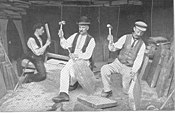Portal:Capitalism
The Capitalism PortalCapitalism is an economic system based on the private ownership of the means of production and their operation for profit. Central characteristics of capitalism include capital accumulation, competitive markets, price systems, private property, property rights recognition, voluntary exchange, and wage labor. In a market economy, decision-making and investments are determined by owners of wealth, property, or ability to maneuver capital or production ability in capital and financial markets—whereas prices and the distribution of goods and services are mainly determined by competition in goods and services markets. Economists, historians, political economists, and sociologists have adopted different perspectives in their analyses of capitalism and have recognized various forms of it in practice. These include laissez-faire or free-market capitalism, anarcho-capitalism, state capitalism, and welfare capitalism. Different forms of capitalism feature varying degrees of free markets, public ownership, obstacles to free competition, and state-sanctioned social policies. The degree of competition in markets and the role of intervention and regulation, as well as the scope of state ownership, vary across different models of capitalism. The extent to which different markets are free and the rules defining private property are matters of politics and policy. Most of the existing capitalist economies are mixed economies that combine elements of free markets with state intervention and in some cases economic planning. Capitalism in its modern form emerged from agrarianism in England, as well as mercantilist practices by European countries between the 16th and 18th centuries. The Industrial Revolution of the 18th century established capitalism as a dominant mode of production, characterized by factory work and a complex division of labor. Through the process of globalization, capitalism spread across the world in the 19th and 20th centuries, especially before World War I and after the end of the Cold War. During the 19th century, capitalism was largely unregulated by the state, but became more regulated in the post–World War II period through Keynesianism, followed by a return of more unregulated capitalism starting in the 1980s through neoliberalism. Market economies have existed under many forms of government and in many different times, places, and cultures. Modern industrial capitalist societies developed in Western Europe in a process that led to the Industrial Revolution. Capitalist economies promote economic growth through accumulation of capital, however a business cycle of economic growth followed by recession is a common characteristic of such economies. (Full article...) Selected article
The slate industry in Wales began during the Roman period when slate was used to roof the fort at Segontium, modern Caernarfon. The slate industry grew slowly until the early 18th century, from when it expanded rapidly and reached its peak output in the late 19th century, at which time the most important slate producing areas were in north-west Wales. These included the Penrhyn Quarry near Bethesda, the Dinorwig Quarry near Llanberis, the Nantlle Valley quarries and Blaenau Ffestiniog, where the slate was mined rather than quarried. Penrhyn and Dinorwig were the two largest slate quarries in the world, and the Oakeley mine at Blaenau Ffestiniog was the largest slate mine in the world. The Great Depression and the Second World War led to the closure of many smaller quarries, and competition from other roofing materials, particularly tiles, resulted in the closure of most of the larger quarries in the 1960s and 1970s. Slate production continues on a much reduced scale. (Full article...)
Selected biography
'Lysander Spooner (January 19, 1808 — May 14, 1887) was an American abolitionist, entrepreneur, lawyer, essayist, natural rights legal theorist, pamphletist, political philosopher, Unitarian and writer often associated with the Boston anarchist tradition, although the notion of Spooner as an anarchist has been challenged by legal historian Clay S. Conrad, who pointed out that Spooner advocated constitutionally limited governments in his writings (e.g., Essay on the Trial by Jury, 1852).
Spooner was a strong advocate of the labor movement, anti-authoritarian and individualist anarchism in his political views. His economic and political ideology has been identified by some scholars libertarian socialism, left-libertarianism, free-market socialism, and mutualism, while others identify them as right-libertarian, anarcho-capitalist, and propertarianist. According to anarchist George Woodcock, Spooner was a member of the International Workingmen's Association (First International). His writings contributed to the development of both left-libertarian and right-libertarian political theory. Lysander Spooner also influenced Mutualist Associates as Clarence Lee Swartz who cited him as one of the major liberty advocates in history and a pioneer of mutual banking and competition. Spooner's writings include the abolitionist book The Unconstitutionality of Slavery and No Treason: The Constitution of No Authority, which opposed treason charges against secessionists. Spooner is also known for competing with the Post Office with his American Letter Mail Company. However, it was closed after legal problems with the federal government. (Full article...) Selected quote
General imagesThe following are images from various capitalism-related articles on Wikipedia.
Did you know
CategoriesRelated portalsCapitalism topicsCapitalism .. Private property .. Capitalist mode of production .. Laissez-faire .. Ludwig Von Mises .. Murray N. Rothbard .. Economic freedom .. Adam Smith .. Money .. Ronald Reagan .. American capitalism .. Criticisms of socialism .. Patent .. The Wealth of Nations .. Corporate capitalism .. Democratic capitalism .. Milton Friedman Things you can do Improve this portal! Associated WikimediaThe following Wikimedia Foundation sister projects provide more on this subject:
Discover Wikipedia using portals |















































